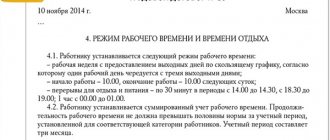How many hours a week should a doctor work?
According to Art. 350 of the Labor Code of the Russian Federation, the working hours of health workers, as a general rule, should not exceed 39 hours per week . Decree of the Government of the Russian Federation dated February 14, 2003 No. 101 establishes reduced working hours for certain categories of medical workers, depending on their specialty. The document specifies which medical workers in which specialties should work no more than 36, 33, 30 hours a week .
The most controversial issue is the 33-hour work week for medical workers - narrow specialists who deal exclusively with outpatients. The concept of “outpatient appointment” is currently not defined by any legal act. And now, as a rule, narrow specialists work 39 hours a week , because, if we talk about the literal interpretation of the law, the working week of 33 hours is not established for them, because when conducting outpatient visits they have a lot of other work, this is just work related to medical examinations, medical examinations, etc.
It is worth noting that in a number of cases doctors managed to defend their right to a 33-hour week.
As for the duration of working hours by day, here, too, the prerogative of rationing labor belongs to the employer, who actually has only one limitation - he is bound by weekly standards of working time for medical workers, which should not exceed 39 hours per week (Article 350 of the Labor Code of the Russian Federation) or 36 hours, if we are talking about working conditions in workplaces that, according to the results of a special assessment, are classified as hazardous working conditions of the 3rd or 4th degree (Article 92 of the Labor Code of the Russian Federation).
The employer can establish either a five-day or a six-day working week, and also has the right to sum up working time (Article 104 of the Labor Code of the Russian Federation), i.e. establish a special working regime when, due to working conditions, it is impossible to maintain daily or weekly working hours for a specific category of employees. At the same time , the employer must ensure that it does not exceed the established limit of working hours for the accounting period . If a medical worker has exceeded this limit, then in this case he has actually worked overtime (Article 92 of the Labor Code of the Russian Federation) and has the right to demand additional payment for his work (Article 152 of the Labor Code of the Russian Federation) .
In the event that he does not receive additional payment, then such a violation of labor standards can be challenged, including in court.
At the same time, medical workers often complain that they are forced to work two or three times a day, 24 hours a day, and they are not paid properly for this . It is worth noting that according to Art. 4 of the Labor Code of the Russian Federation, forced labor is prohibited in our country. And, being a subject of labor law, a medical worker can refuse additional work if it is not properly paid. For example, you can write to the head physician a statement of consent to work part-time, by virtue of Part 2 of Art. 60 Labor Code of the Russian Federation.
Do not confuse combination and part-time work .
- Part-time work is the performance by an employee of other regular paid work under the terms of an employment contract in his free time from his main job (Article 60.1 of the Labor Code of the Russian Federation).
- Combination - performing additional work for the same employer within the working hours.
Often medical workers have a question related to part-time work: are additional vacations allowed for part-time work? The legislation provides that all compensation that is provided to an employee at his main place of work is also provided for part-time work (Part 2 of Article 287 of the Labor Code of the Russian Federation). A part-time employee is granted leave if he is entitled to it according to the organization’s documents, the same as at his main job.
Working hours
So that the specialist knows how and how much to work, schedules are drawn up. To do this, determine the normal time for a specific period: the duration of the shift (norm) is multiplied by the number of days in the accounting period for a five-day period. To calculate the norm of days, the production calendar of health workers does not differ from the calendar that is used in other cases. The number of hours by which the working time on holidays is reduced is subtracted from the resulting number.
The mechanism for calculating the norm is determined by order of the Ministry of Health and Social Development of Russia dated August 13, 2009 No. 588n. For a normal shift duration, the number of hours per week (39, 36, 33, 30, 24) is divided into 5 days:
| Working week of a health worker, h | Shift duration, h |
| 24 | 4,8 |
| 30 | 6 |
| 33 | 6,6 |
| 36 | 7,2 |
| 39 | 7,8 |
Work on the day before the holiday is reduced by one hour. To determine the worked norm, the duration of the accounting period is used. Upon completion, possible processing is calculated. For example, the standard working time for health workers in 2020, if the accounting period is a 36-hour week, will be:
248 × 7.2 – 5 = 1780.6 hours,
Where:
- 248 - number of days in a five-day period;
- 7.2 - normal shift duration;
- 5 - the number of hours on pre-holiday days per year by which the time is reduced.
Shift work
Shift work - the activities of the institution are organized in several shifts, when one shift replaces another. In this mode, the shift schedule reflects:
- accounting period - a period of time (day, week, month, quarter, year) during which the employee works the standard time;
- shift duration;
- the procedure for transferring from one shift to another, the employee’s actions in case of no-show of a shift worker.
Read more: How to maintain work schedules for health workers in a clinic
Work schedule in the organization
How to create a shift schedule
Home duty
Home duty is a special mode when a specialist is at home and awaits a call to work. In this case, the daily routine of the health worker is regulated by Article 350 of the Labor Code of the Russian Federation and Order of the Ministry of Health of Russia dated April 2, 2014 No. 148n. The legal requirements for this mode are the same as for the usual time of performance of official duties. They are involved in such duties only with the consent of the employee, and the work regime itself is specified in the employment contract. Duties occur according to the approved shift schedule.
During home duty, each hour is counted as 30 minutes of core work. Travel time from home to the place of call and back, the period of being on call is counted as a regular labor hour.
Work on holidays
Due to the nature of their profession, doctors are not allowed to stop working on holidays. There are the following options for working on holidays:
- if according to the schedule the shift falls on a holiday, the person works as usual; the standard hours for health workers already include this time. But such work is paid at a higher rate;
- by order of the employer and with the written consent of the employee, they organize entry to the workplace to perform unforeseen work. Such activities take place outside working hours and are paid double or single with the provision of time off;
- exit is considered an emergency situation (Article 113 of the Labor Code of the Russian Federation), and the employee’s consent to work in most cases is not required. An exception is made for certain categories of workers (disabled people, women with children under 3 years old, etc.), but they are allowed to refuse to go out on holidays.
Regime during the epidemic season
During epidemics, a high-risk regime is introduced in medical institutions. The epidemic is considered an emergency situation, so the employer involves subordinates to work on days off or overtime without their consent (except for certain categories of employees). The employer is obliged to keep records of the time worked by each hired specialist and pay him at an increased rate.
What are the standards for admission to certain specialists?
One of the most pressing questions is what are the standards for receiving certain specialists? This issue is also left to the employer, who, in turn, must build on the standard standards established by the federal executive authorities.
For example, the Ministry of Health of Russia has approved standard industry standards for the time for one patient to visit a local pediatrician - 15 minutes, an obstetrician-gynecologist - 11 minutes, an ophthalmologist - 14 minutes. etc. (Order of the Russian Ministry of Health dated June 2, 2015 No. 290n).
Such standards are the basis for calculating the workload standards for doctors of medical organizations that provide primary medical care and primary specialized health care in an outpatient setting.
Does this mean that the approved standards become mandatory for the doctor to follow?
No, this document is advisory in nature , and is primarily intended for persons calculating admission standards and labor standardization - for heads of medical organizations and constituent entities of the Russian Federation, who can also take part in standardization by issuing appropriate standard acts on which the employer is already based or medical organization. That is, this is a kind of guideline for the parties to labor relations. These norms become mandatory if they are included in the terms of the doctor’s employment contract, his job description, collective agreement and other local regulations governing labor relations, including labor standards.
The requirement of the order is also noteworthy: only 35% of the time of a medical appointment should be spent on medical documentation, the rest - on the patient.
And it is the employer’s responsibility to ensure this particular time standard.
Peculiarities of working hours during part-time work
In connection with the reduction in working hours, medical workers have a question: can they work under an employment contract in several places part-time? They may, however, have their own characteristics. A number of them are established by Resolution of the Ministry of Labor of the Russian Federation dated June 30, 2003 No. 41 (hereinafter referred to as Resolution No. 41).
The duration of work for each employer is established by agreement of the parties (employee and employer), but it cannot exceed half of the monthly standard working time based on the length of the working week. If half of the monthly norm for the main job is less than 16 hours per week, then the duration of part-time work should not exceed 16 hours of work per week. Junior medical staff can work part-time for each employer for no more than a monthly working time limit. For doctors and paramedical staff in areas or cities where there is a shortage of medical personnel, the duration of work under each employment contract also cannot exceed the monthly working time standard.
At the same time, the duration of part-time work for specific positions in institutions and other organizations of federal subordination is established in the manner determined by the federal executive authorities, and in institutions and other organizations under the jurisdiction of the constituent entities of the Russian Federation or local governments - in the manner determined by the authorities state authorities of the constituent entities of the Russian Federation or local governments.
For health workers operating in rural areas, part-time work may be extended, but only by decision of the Government of the Russian Federation and taking into account the opinion of the all-Russian trade union and the all-Russian association of employers. Thus, in accordance with Decree of the Government of the Russian Federation dated November 12, 2002 No. 813, such employees can work part-time for a total of 8 hours a day and 39 hours a week.
Please note that part-time work does not include:
- conducting a medical examination with a one-time payment;
- provision of consultations by highly qualified specialists in institutions and other organizations in an amount of no more than 300 hours per year, and others (clause 2 of Resolution No. 41).
Performing the specified work is permitted during regular working hours with the consent of the employer.
Medical workers on duty
On duty is the most interesting feature of a health worker’s activities from the point of view of labor law. They have their own specific regulations.
The first question is: should a health worker be on duty or not? The obligation of a health worker to be on duty around the clock or for a certain period of time should be enshrined either directly in the employment contract or in job descriptions.
If this is not the case, then the health worker has every right to refuse duty. If this is established by local documents or an employment contract, then the health worker must be on duty.
Often, the number of hours worked by a medical worker on duty goes beyond the normal working hours . Some employers regard this as part-time work.
And they do not draw up appropriate employment contracts. Resolution of the Ministry of Labor of the Russian Federation dated June 30, 2003 No. 4 “On the peculiarities of part-time work for teaching, medical, pharmaceutical and cultural workers” established that working according to the staff schedule in the same medical position is not part-time work . If a health worker is on duty for his main job, then this job is not a part-time job. If his total hours exceed the number of hours during normal working hours, then this work is regarded as overtime . Payment must be in accordance with labor legislation: for the first two overtime hours - at half-time rate, and for subsequent hours - at double rate.
Another option for registering duty is when a medical worker enters into a part-time employment contract and works part-time. His main work is in a hospital, in a clinic during the working day, and he is on duty on the basis of a part-time agreement.
In accordance with Art. 350 of the Labor Code of the Russian Federation there is such a specific type of duty as duty at home . A medical worker can be on duty at home, and a special working hours regime is established for this type of duty. It is counted as follows: 1 hour of duty at home is counted as half an hour of work in a hospital setting or at the main place of work.
Article 350 of the Labor Code of the Russian Federation and Order of the Ministry of Health of Russia dated 02.04.2014 No. 148n “On approval of the Regulations on the peculiarities of the working time regime and recording of working time when medical workers of medical organizations carry out duty at home” also establishes that the time on duty at home should not exceed the usual norm working hours . But it happens that the time that a health worker spends on duty at home exceeds the time that he must work as his main working time.
Accordingly, such work should be regarded as overtime with payment for the first two overtime hours at one and a half times the rate, and for subsequent hours at double the rate. For home duty, the same requirements are established as those established by labor legislation regarding working hours. When recording working hours together, medical workers are provided with a duty schedule. If the duty falls on a weekend and if it is within normal working hours according to the schedule, then this duty is considered normal. If duty falls on holidays, then regardless of whether it is considered ordinary or unusual, i.e. outside working hours, it is paid no less than double the amount.
Working time concept
What is working time is determined by Art. 91 Labor Code of the Russian Federation. This is the time when a medical worker performs official duties and obeys labor regulations. It includes:
- being on business trips;
- lunch break for health workers at the workplace (Article 108 of the Labor Code of the Russian Federation);
- downtime (Article 157 of the Labor Code of the Russian Federation);
- special breaks during the shift (Article 109 of the Labor Code of the Russian Federation);
- breaks for feeding the child (Article 258, Article 264 of the Labor Code of the Russian Federation).
IMPORTANT!
The coronavirus pandemic forced the authorities to introduce a regime of self-isolation and approve non-working days with pay from 30.03 to 11.05, inclusive. But such decisions will not affect how doctors work from May 1 to May 11, since they do not apply to medical organizations, as stated directly in the presidential decrees. So if we talk about whether doctors are working next week, then employees of public clinics will have to work on the 6th, 7th and 8th, and private clinics will have to work according to the schedule approved by management.
In accordance with the Federal Law of November 21, 2011 No. 323-FZ “On the fundamentals of protecting the health of citizens in the Russian Federation,” a medical worker is a specialist who meets the following conditions:
- has a medical or other professional education;
- works in a medical institution;
- his professional duties are to carry out medical activities;
- has a certificate of accreditation or a specialist certificate.
The categories of health workers are established by the appendix to the order of the Ministry of Health of Russia dated December 20, 2012 No. 1183n.
Paramedic duty every other day
QUESTION. Does the chief physician have the right to force a nurse to go on duty in 24 hours?
ANSWER . By virtue of Art. 100 of the Labor Code of the Russian Federation, the length of the working week, the duration of daily work (shift), the procedure for providing days off are established by internal labor regulations, collective agreements, agreements, and for employees whose working hours differ from the general rules established by the employer - by an employment contract. At the same time , in accordance with Art. 350 of the Labor Code of the Russian Federation for medical workers, a reduced working time is established - no more than 39 hours per week .
For certain categories of workers, for example, workers engaged in work with harmful and (or) dangerous working conditions, or medical workers occupying the corresponding positions specified in Decree of the Government of the Russian Federation of February 14, 2003 No. 101, a special working time may be established .
In turn, on the basis of Art. 104 of the Labor Code of the Russian Federation , if an organization cannot comply with the daily or weekly working hours established for a certain category of employees, it is allowed to introduce summarized recording of working hours, in which the duration of working hours for the accounting period cannot exceed the normal number of working hours .
Moreover, if an organization has introduced shift work, then work for two shifts in a row is prohibited (Article 103 of the Labor Code of the Russian Federation) , and the duration of daily rest (between shifts) along with the lunch break, in accordance with clause 11 of the Resolution of the Council of People's Commissars of the USSR dated September 24, 1929 , must be at least twice the duration of work on the working day (shift) preceding the rest. This means that if, for example, the duration of a shift is 24 hours, then the rest period between shifts must be at least 48 hours .
Please note that changes to the work schedule by the employer unilaterally, without the consent of the relevant employee, are not allowed by virtue of Art. 72 of the Labor Code of the Russian Federation, since the work schedule with which the employee was previously familiarized is inherently a condition of work and within the meaning of Art. 72 of the Labor Code of the Russian Federation cannot be changed by the employer without the written consent of the employee.
Thus, the employer, represented by the chief physician, does not have the right to oblige the nurse to go on duty in a day without her consent.
Time tracking
The employer ensures that the actual time worked by each employee is recorded (Article 91 of the Labor Code of the Russian Federation). To do this, use a time sheet for health workers, where they enter the hours of work:
- actual;
- in conditions other than normal (harmful);
- at night time;
- overtime;
- on holidays and weekends.
Based on the report card data at the end of the accounting period, the number of hours worked overtime is determined.
For the position of manager without work experience
QUESTION. Can a leading researcher who has not had medical experience for ten years (according to the work record book), but who has a certificate of primary retraining in the relevant specialty and a valid specialist certificate, be appointed to the position of head of the department?
ANSWER . Yes, it can, since (based on the data presented) the employee appointed to the position of head of the department meets all the requirements, since he has a valid specialist certificate and a certificate of primary retraining in the relevant specialty.
At the same time, please note that by virtue of clause 3, part 1, article 100 of the Federal Law of November 21, 2011 No. 323-FZ, persons who have received a medical or pharmaceutical education and have not worked in their specialty for more than five years may be allowed to practice medicine or pharmaceutical activities in accordance with the acquired specialty after completing training in additional professional programs (professional retraining) and having a specialist certificate, and the candidate for the position of head of the department, as you indicated, has these documents.
Dismissal from a part-time position
QUESTION . I work in the state autonomous institution “Dental Clinic” as a dentist on an internal part-time basis. Does management have the right to remove me from this position without my consent for failure to fulfill the plan for paid services? The UET plan is being implemented.
ANSWER . In this case, the manager has no grounds to terminate the employment contract with you, since such a basis for terminating the employment contract is not provided for by the Labor Code of the Russian Federation. If the employment contract is terminated, we recommend contacting the labor inspectorate and the prosecutor's office to check the legality of your dismissal.
When an employer forces you to do extra work
QUESTION . I work as a local therapist in a city clinic. The only clear criteria in the employment contract is that the working week should not exceed 39 hours. There are not enough doctors at the clinic, and the administration forces them to handle calls at home not only from the attached therapeutic area, but also from neighboring ones. Approximately 5.5 hours per day (30 patients) - an appointment at the clinic and another 5 house calls from different areas. Is this legal, how to protect your rights, on the basis of what documents?
ANSWER . In your case, there is actually a combination of positions when you perform work for absent employees.
However, such work within the meaning of Part 1 of Article 60.2 of the Labor Code of the Russian Federation is possible only with the written consent of the employee and for additional payment.
We recommend that you contact the head of the medical organization with a corresponding application to refuse additional admission of patients from other areas or to pay for such additional work.
We also draw your attention to the fact that, according to Art. 60.2 of the Labor Code of the Russian Federation, with the written consent of the employee, he may be entrusted with performing, during the established duration of the working day (shift), along with the work specified in the employment contract, additional work for an additional fee , the amount of which, by virtue of Part 3 of Art. 151 of the Labor Code is established by agreement of the parties to the employment contract, taking into account the content and (or) volume of additional work.
33-hour, 30-hour, 24-hour work week for health workers
Appendix No. 2 and No. 3 to Government Resolution No. 101 contains information with a list of positions for which a 33-hour and 30-hour working week is established, respectively:
| No. | Medical institution | Nature of work performed | Position of health worker | Standard working hours |
| 1 | Treatment and preventive organizations (clinics, outpatient clinics, first aid stations) | Outpatient care | Doctor | 33 hours/week |
| 2 | Physiotherapeutic medical institutions | Work on UHF medical generators with a power of over 200 kW on a full-time basis | Doctor, nursing staff | 33 hours/week |
| 3 | Dentistry | Direct provision of medical care and patient care | Dentist, including:
| 33 hours/week |
| 4 | Anti-tuberculosis organizations | Direct provision of medical care and patient care | Doctors, including doctors-heads of structural units, nursing and junior medical staff | 30 hours/week |
| 5 | Pathological and anatomical bureaus | Direct work with corpses and cadaveric material | Doctor, including the head of structural units, nursing and junior medical staff | 30 hours/week |
| 6 | ITU institutions | Conducting medical and social examination of citizens | Doctors, including doctors-heads of structural units, nursing and junior medical staff | 30 hours/week |
| 7 | Medical Examiner's Office | Direct work with corpses and cadaveric material | Doctors, including doctors-heads of structural units, nursing and junior medical staff | 30 hours/week |
| 8 | Fluorography rooms | Work with gamma therapy, X-ray diagnostics, fluorography, work with patients with radioactive drugs applied | Doctors, including doctors-heads of structural units, nursing and junior medical staff | 30 hours/week |
A minimum working time (24 hours per week) is provided for health workers who directly carry out gamma therapy, as well as conducting experimental gamma irradiation with gamma drugs in radiomanipulation rooms and laboratories.









